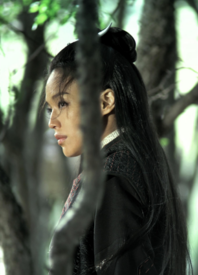
Antiheroes have been around in art forms for a long time yet they still surprise me, and the anti-heroine Hou Hsiao Hsien’s The Assassin doesn’t even get a conventional homecoming. It’s a 9th century Chinese nun, Jiaxin (Sheu Fang-Yi) who brings her back to court.
The titular character in The Assassin is Nie Yinniang (Shu Qi). Jiaxin abducts her when the latter was a child to train her as an assassin, a plan which, for the most part works. Returning to quasi-independent Weibo, a princess brings her up to speed on family history.
What Weibo doesn’t know is that Yinniang is back to bring swift justice to court – specifically, she’s there to kill her cousin / ex fiancee General Tian Ji’an (Chang Chen). An opportunity arises as she walks into Tian, alone with his concubine Huji (Nikki Hsieh).
The Assassin is catnip to some film goes in the ways it bends genre rules, as Yinniang is killing people, as per her job, but does so to protect Tian. She also protects other men, like rescuing ia Xia Jing (Ethan Juan) during an ambush.
All this killing is taking a toll on Yinniang as she makes enemies, old and new, like who is this masked person who shows up, ambushing Xia’s footmen? And what are the consequences of Yinniang’s delayed actions towards Tian Ji’an?
The Assassin will not have the same amount or length of fight scenes for a Wuxia film, as these scenes are few and far between, lasting maybe two minutes. It’s understandable, though, that Hou had other interests in adapting the Nie Yinniang story.
Martial arts fans may feel like The Assassin is short changing them, but it has its rewards. There are still moments that capture Yinniang’s moral ambiguity. There are also the great landscapes that may remind one of great Chinese art of that time.
The Assassin also feels like there’s too many scenes in the home front, of intrigue in court. There’s also a scene involving Yinniang and Huji that involve some awkward magic realism. But that happens late enough into the film and it ways that feel excusable.
The Assassin ends with the status quo, with Jiaxin telling Yinniang that her “mind is still hostage to human sentiment”. Sure, the film doesn’t answer the question of how one can strip away their humanity. Sometimes, it’s ok to just take in the world’s beauty and leave human nature in its ambiguous state.
Watch The Assassin on MUBI as part of its post 36th Chamber mini retrospective.
- Rated: TV-14
- Genre: Action, Drama, History
- Directed by: Hou Hsiao-hsien
- Starring: Chang Chen, Ethan Juan, Nikki Hsieh, Sheu Fang-Yi, Shu Qi
- Produced by: Peter Lam Kin-Ngok, Ren Yue
- Written by: Chu Tien-wen, Hou Hsiao-hsien
- Studio: China Dream Film Culture Industry, SpotFilms, Wild Bunch

